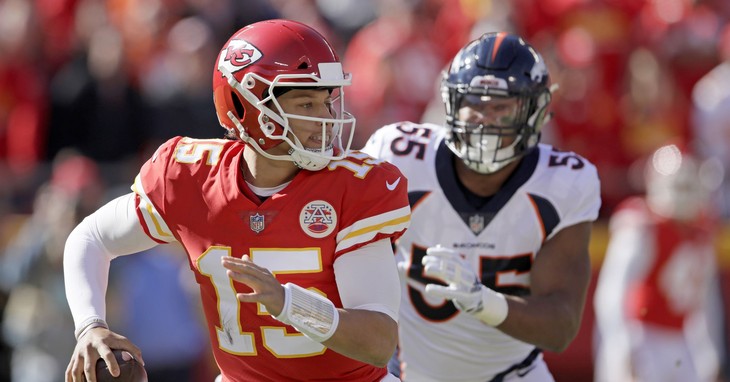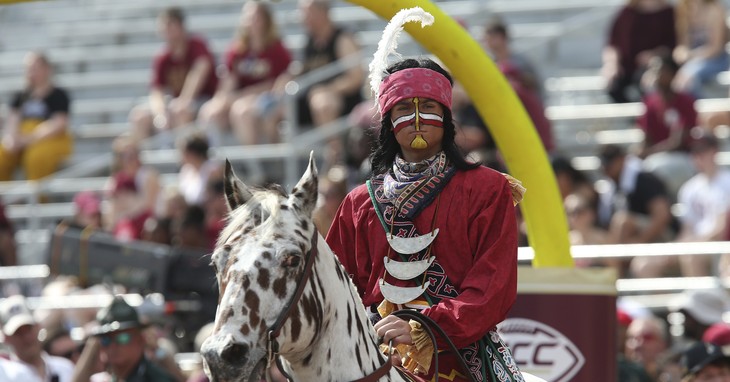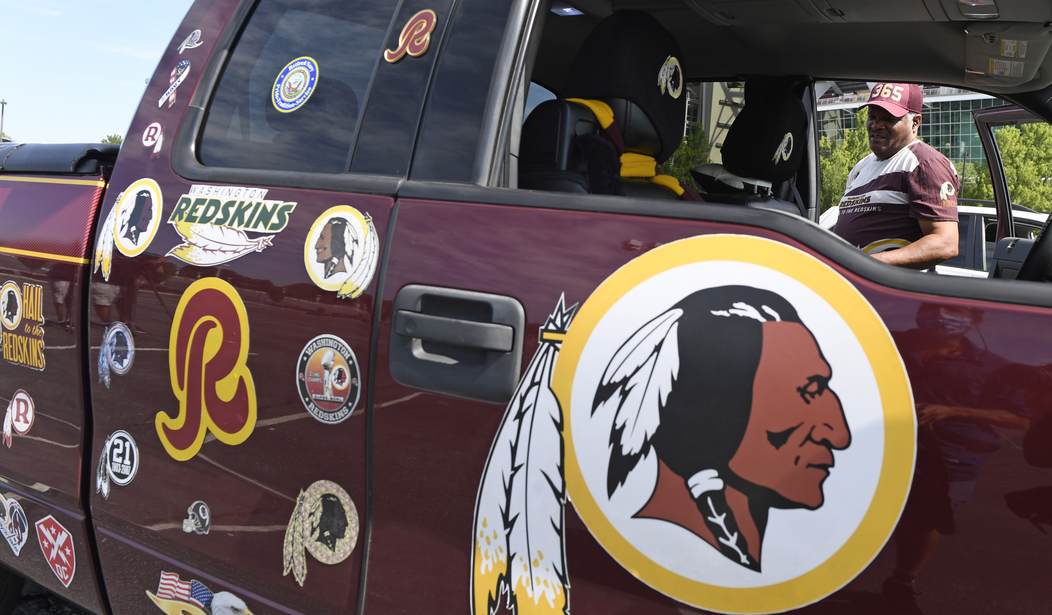Last week, RedState brought you the story of Colorado’s “Anti Indian Mascot” law, which decrees that public schools which don’t remove all references to their Indian mascots by June 1 will face potential fines of up to $25,000 per month. (The use of the word “Indian” is from the law itself.)
Our reporting showed that the issue is significantly more complex than it might at first appear, mostly because many Native Americans actually oppose the forced retirement of some of these mascots — especially ones that are meant to provoke pride rather than ridicule. The Thunderbird is one such example.
We have since interviewed courageous attorney Scott D. Cousins, who is suing the State of Colorado over the measure, and he delves deeper into some of the theories and legal strategies behind the case. He’s put his name and reputation on the line and tells us about some of the backlash he’s faced. Hint: the “R” word was thrown down. Because isn’t it always, these days?
Cousins, a corporate bankruptcy attorney, was first drawn to the mascot wars when his children’s Pennsylvania high school jumped on the name-changing bandwagon. He objected.
The family had always loved their school’s mascot, The Indians, and he couldn’t understand why they were changing it after six decades of use. “I’m very passionate about the issue,” he says.
But, that’s in the past. For the Colorado case, he’s joined forces with the Native American Guardian’s Association (NAGA), a non-profit organization whose motto is, “Educate NOT Eradicate.” He’s working pro-bono, and will only ask for remuneration if they win and are awarded attorney’s fees.
— Native American Guardians (@NAGA58997784) April 19, 2019
NAGA is advocating for:
…increased education about Native Americans, especially in public educational institutions, and greater recognition of Native American Heritage through the high-profile venues of sports and other public platforms.
Notice what NAGA is saying in their mission statement? They do NOT want Native Americans deleted from American life.
In fact, there’s a term for what they’re advocating for, and it’s called “reappropriation.” Rather than just eliminate mascots and all mention of Native American culture, they want to reclaim the narrative.
Sure, there are some depictions of Native Americans that some find offensive, like a mascot named Chief Ugh-Lee, but does that mean you have to throw the baby out with the bathwater? Here’s something you might not have known: the “Redskins” logo, recently cancelled, was designed by a Native American artist whose family is still quite proud of his work.
The Redskins logo that America knows today was originally designed in 1971 by (the late) Native American Walter “Blackie” Wetzel, whose iconic image depicted John “Two Guns” White Calf, a Blackfeet Chief who also appears on the Buffalo Nickel.
Wetzel’s son Lance asserted that the logo was not offensive, and actually evoked pride in Native Americans. “You look at the depiction of the Redskins logo and it’s of a true Native American,” he told The Daily Wire in a ’20 interview. “I always felt it was representing my people.”
Hmm, you don’t say. I think that’s called, “disrupting the narrative.”
Cousins also points out that when the playoffs come around in certain sports, and teams like the Kansas City Chiefs are doing well, spirits are lifted on reservations. “People get excited, with lots of enthusiasm because of the pride associated with the team’s name,“ he says.

Now, let’s examine the lawsuit. In addition to NAGA, the case is joined by five Native Americans, including two minor students, John Doe and Jane Doe. The suit names as its defendant the official tasked with enforcing the law, Kathryn Redhorse, Executive Director of the Colorado Commission of Indian Affairs.
The suit starts out with a bang:
Imagine a state law that barred schools from using the name or image of an African American individual on its logos or letterhead. That would be the end of school names honoring Martin Luther King Jr., President Barack Obama, or Justices Thurgood Marshall and Clarence Thomas.
Boom! Clearly, they came to didn’t come to play around. The brief continues, explaining that as plaintiffs, they do not support demeaning caricatures like the aforementioned Chief Ugh Lee, but they do support positive depictions of their heritage.
Nevertheless, culturally appropriate Native American names, logos, and imagery serve to honor Native Americans, and to help public schools neutralize offensive and stereotypical Native American caricatures and iconography, while teaching students and the general public about American Indian history.
The brief goes on to highlight the case of “The Slants,” an Asian American band whose trademark application was denied by the U.S. Patent and Trademark Office. The Supreme Court overruled the decision, explaining that the band purposely used the charged name “to supplant a racial epithet, using new insights, musical talents, and wry humor to make it a badge of pride.”
In other words, they had successfully “reappropriated” the slur instead of trying to pretend it didn’t exist. Slants frontman Simon Tam explained his thinking:
“We grew up and the notion of having slanted eyes was always considered a negative thing. Kids would pull their eyes back in a slant-eyed gesture to make fun of us. … I wanted to change it to something that was powerful, something that was considered beautiful or a point of pride instead.”
A powerful argument.
The crux of the mascot case, though, relies on constitutional issues. The Plaintiffs argue that implementation of the law would violate the Fourteenth Amendment, the First Amendment, as well as Title VI of the Civil Rights Act of 1964.
We don’t have space here to cover the entirety of the legal theories presented, but in a nutshell, they argue, “SB 21-116 unlawfully enacts state-sanctioned race discrimination against Plaintiffs.” Think about it: Why can you have a Viking or Celtic mascot, but not a Native American one?
Cousins attributes the desire to eradicate mascots to “white savior syndrome.” He describes critics’ thought process as, “it’s cute that Native Americans have opinions, but we know what’s best for them. Trust us.”
He’s certainly paid a price for his advocacy, and was fired from his law firm after another attorney sent his employer an inflammatory email. Cousins is suing for defamation, with the suit alleging that the other lawyer “falsely attacked and smeared Cousins as a ‘white, Christian,’ ‘racist’ and religious bigot, and someone whose conduct constituted racial and religious bigotry.”
He lost the first round, but the matter is under appeal, with the next hearing scheduled in May.
Back to the mascot case: Colorado last week surprisingly filed a “Waiver of Reply Brief” to Cousins’ latest motion, meaning they have nothing more to add to the case (a move Cousins said he’s never seen in over 30 years of lawyering), so the matter now goes to the judge. She’s expected to rule prior to the June 1 deadline (the date that the $25,000 monthly fines start).
If the ruling is against him, Cousins says he’ll “put on my running shoes and run up to the 10th Circuit (of the US Court of Appeals) to argue for a stay of the decision and an injunction.”

My takeaway from this deep dive into the mascot controversy is that–as with so many issues surrounding race in our society today–simple one-liners don’t apply. Just shouting, “you’re a racist!” when you don’t agree with another’s opinion is hardly a recipe for resolution. Cancelling and memory-holing everything that might have a whiff of controversy or makes someone uncomfortable does not solve the problem, either. In the case of “Indian mascots,” the opinion of Native Americans should be taken into account, not just the opinion of “patronizing white progressives” that Cousins describes.














